Ditapis dengan

E-book Knowledge : a Human Interest Story
In this book the author argues for a groundbreaking perspective that knowledge is inherently interest-relative. This means that what one knows is influenced not just by belief, evidence, and truth, but crucially by the purposes those beliefs serve. Drawing from classical Ny?ya epistemologies, the book asserts that knowledge rationalizes action: if you know something, it is sensible to act on it…
- Edisi
- -
- ISBN/ISSN
- 9781805113966
- Deskripsi Fisik
- 286 hlmn
- Judul Seri
- -
- No. Panggil
- 121 WEA k
E-book Conceiving People : Genetic Knowledge and the Ethics of Sperm and Egg …
What does it mean to you when I say, “These are my parents”? What would you want to know in order to figure out whether they are, in fact, my parents? Whether they are my genetic progenitors? Whether the woman on the right gestated me? Whether they raised me?We all know that the relationships captured by these questions— the ge-netic relationship, the gestational relationship, and the soc…
- Edisi
- -
- ISBN/ISSN
- 9780190063054
- Deskripsi Fisik
- 257 hlm
- Judul Seri
- -
- No. Panggil
- 174.2 GRO c

Self-Improved Me
'When will you get married?' 'Why does your child behave that way?' 'You haven't joined any pilates class yet?' 'Beyonce also has 24 hours in a day, you know?' As women, we have all been asked these questions. They insidiously creep into our minds and make us feel guilty. We start doing so much out of the fear of missing out, simply because everybody is doing it (that's how it seems on soci…
- Edisi
- Cet. 1
- ISBN/ISSN
- 9789815266153
- Deskripsi Fisik
- x, 176 hlm; 13,5 x 21,5 cm
- Judul Seri
- -
- No. Panggil
- 158.1 PUT s

Untukmu, Anak Bungsu
Orang-orang bilang, anak bungsu itu paling disayang, paling dimanja, dan yang paling diperhatikan. Padahal, anak bungsu juga adalah anak yang mudah merasa kesepian dan dilupakan, terlebih lagi di saat orang tua sudah menua dan kakak sudah sibuk dengan kehidupan masing-masing. Terkadang, anak bungsu juga harus menyimpan mimpi-mimpinya sendiri untuk mewujudkan mimpi-mimpi keluarga. "Jika bisa me…
- Edisi
- Cet. 2
- ISBN/ISSN
- 9789797948313
- Deskripsi Fisik
- iv, 152 hlm; 13 x 19 cm
- Judul Seri
- -
- No. Panggil
- 153.8 HID u

Full Soal HOTS Higher-Order Thingking Skills FOKUS MENGHADAPI PSIKOTES METODE…
Fokus Menghadapi Psikotes hadir sebagai solusi bagi Anda yang ingin sukses dalam menghadapi bergabai jenis Psikotes. Buku ini disusun oleh tim yang sudah berpengalaman; beranggotakan praktisi-praktisi Psikometri. Anda akan mendapatkan berbagai macam pembahasan Psikotes yang terdiri atas Penalaran Verbal, Penalaran Kuantitatif, Penalaran Figural, dan Tes Psikometri.
- Edisi
- -
- ISBN/ISSN
- 978602571010
- Deskripsi Fisik
- vi + 450 hlm.;
- Judul Seri
- -
- No. Panggil
- 155.25 TIM F

Rahasia Sukses Personal Branding Untuk di Era Pemula Society
Buku ini tidak hanya bertujuan untuk memberikan panduan praktis dalam membangun personal branding yang kuat, tetapi juga untuk mengajak kita merenung, menggali, dan mengembangkan potensi diri yang mungkin belum kita sadari.
- Edisi
- -
- ISBN/ISSN
- 9786235480213
- Deskripsi Fisik
- viii + 242 hlm.; 13 cm x 19 cm
- Judul Seri
- -
- No. Panggil
- 150.1 FIN r

Conversation on Love: Bagaimana Cinta Berakhir dan Bagaimana Ia Bermula
Setelah bertahun-tahun merasa bahwa cinta selalu berada di luar jangkauan, jurnalis Natasha Lunn mencoba memahami bagaimana cinta bekerja dan berkembang sepanjang hidup. Dia menemui para penulis, terapis, tokok budaya, dan pakar untuk mempelajari pengalaman mereka, mulai mendalami kompleksitas cinta? Bagaimana kita mempertahankannya? dan bagaimana kita bisa bertahan ketika kehilangannya? Mel…
- Edisi
- 2
- ISBN/ISSN
- 9786020677071
- Deskripsi Fisik
- xvi + 352 hlm.;19cm x 13 cm
- Judul Seri
- -
- No. Panggil
- 158.2 NAT c

Kamu Tidak Istimewa
Riwayat ini mengandung banyak paham. Bias Prasangka hadir melengkapi desus. Remuk rendam menjadi sorakan. Bimbang. Barangkali Jenaka? Atma lunglai rasa tak menapak. Kosong termanipulasi gelagatnya sendiri. Piala " penderitan terbaik" tergenggam erat. Enggan lepas. Hingga sebuah utas melingkupi. Yang istimewa bukan hanya kamu. Dirimu jauh dari satu-satunya. Allah mencintai semua. Berikut g…
- Edisi
- 5
- ISBN/ISSN
- 978623005574
- Deskripsi Fisik
- xi + 92 hlm
- Judul Seri
- -
- No. Panggil
- 155.25 NAT k

Seorang Wanita yang Ingin Menjadi Pohon Semangka di Kehidupan Berikutnya
Jawab dengan cepat: Seandainya terlahir kembali di kehidupan berikutnya, kamu ingin menjadi apa? Berikut beberapa jawaban unik yang pernah kudengar baik dalam ruang praktik maupun ketika ngobrol santai dengan teman-teman: "Aku ingin menjadi ubur-ubur, melayang bebas tanpa tekanan atasan dan ekspektasi sosial." "Aku ingin menjadi pohon pinus, karena tinggi dan keren." "Aku ingin menjadi ikan …
- Edisi
- Cet. 4
- ISBN/ISSN
- 9786020681276
- Deskripsi Fisik
- xviii, 206 hlm; 13,5 x 20 cm
- Judul Seri
- -
- No. Panggil
- 158.1 AND s

Ibu, Aku Nggak Sekuat Itu
Ibu, aku nggak sekuat itu. Ada banyak hal yang aku sembunyikan dari ibu. Tentang aku yang sering menangis di kamar sendirian, menangis di perjalanan pulang. Juga menangis karena beratnya hidup ketika harus jadi tulang punggung keluarga sejak sekecil ini. Ternyata jadi dewasa nggak enak, ya, bu? Aku kangen ibu. Aku pengin jadi anak kecil aja, pengin balik ke masa lalu aja, pengin main sepeda sa…
- Edisi
- Cet. 3
- ISBN/ISSN
- 9786231063076
- Deskripsi Fisik
- 216 hlm; 13 x 19 cm
- Judul Seri
- -
- No. Panggil
- 155.25 HEL i
Filosofi Teras : Filsafat Yunani-Romawi Kuno untuk Mental Tangguh Masa Kini (HC)
Lebih dari 2000 tahun lalu, sebuah mazhab filsafat menemukan akar masalah dan juga solusi dari banyak emosi negatif. Stoisisme atau Filosofi Teras adalah filsafat Yunani-Romawi kuno yang bisa membantu kita mengatasi emosi negatif dan menghasilkan mental yang tangguh dalam menghadapi naik turunnya kehidupan. Jauh dari kesan filsafat sebagai topik berat dan mengawang-awang, Filosofi Teras justru …
- Edisi
- -
- ISBN/ISSN
- 9786233469319
- Deskripsi Fisik
- illust, xxviii + 352 hlm; 14 x 21 cm
- Judul Seri
- -
- No. Panggil
- 171 MAN f
2 Detik yang menentukan Kesuksesan Anda
Buku ini adalah gabungan mengesankan dari penelitian dan contoh-contoh praktis bahwa memiliki sedikit informasi yang tepat, pada waktu dan konteks yang tepat, secara cukup memadai ke depan adalah kunci utama kesuksesan dalam bisnis dan dalam bidang-bidang usaha manusia yang lainnya. Penulis memberikan perspektif menarik soal bagaimana kemampuan peramalan yang tersedia bisa membantu kita menjadi…
- Edisi
- -
- ISBN/ISSN
- 9786020313733
- Deskripsi Fisik
- xi + 255 hlm; 15 x 22 cm
- Judul Seri
- -
- No. Panggil
- 158.1 RAN d
Hidden Potential
Kita hidup di dunia yang terobsesi dengan bakat. Kita memuja-muja siswa berbakat di sekolah, atlet genius dalam olahraga, dan anak ajaib dalam musik. Namun, mengagumi orang-orang yang memulai sesuatu dengan keunggulan bawaan lahir membuat kita mengabaikan jarak yang bisa kita tempuh untuk mencapai kejayaan. Kita meremehkan berbagai keterampilan yang bisa kita pelajari dan seberapa jauh kita bis…
- Edisi
- -
- ISBN/ISSN
- 9786020679020
- Deskripsi Fisik
- 320 hlm; 15 x 22.5 cm
- Judul Seri
- -
- No. Panggil
- 155.25 GRA h
Berani Hidup
Berani hidup atau hidup yang berani mengandaikan kesediaan menghadapi tantangan kehidupan serta menjawab tantangan tersebut dengan berbagai sarana yang disediakan kehidupan. Berani hidup juga berarti kesiapan untuk menerima realita yang tidak sesuai dengan harapan seseorang disertai dengan semangat untuk mengubahnya melalui sarana dan berdasarkan prinsip-prinsip yang benar. Hidup berani adalah …
- Edisi
- -
- ISBN/ISSN
- 9786021745304
- Deskripsi Fisik
- iv + 81 hlm; 13 x 20 cm
- Judul Seri
- -
- No. Panggil
- 144 NUR b
Goresan Anak Senja
Sebentar lagi Gonzaga mencapai usianya yang ke-30. Usia yang seharusnya sebuah manusia atau lembaga sudah memiliki karakter dan ciri khas. Usia dimana ia sudah memberikan sumbangan nyata bagi lingkungan dan bangsa dimana ia berdiri.Kolose Gonzaga memiliki fokus perhatian pada 3 arah programatik, yaitu: Kemiskinan, Kerusakan Lingkungan, dan fundamentalisme agama.Atas dasar tiga latar belakang te…
- Edisi
- -
- ISBN/ISSN
- 9786020448411
- Deskripsi Fisik
- 140 hlm; 14 x21 cm
- Judul Seri
- -
- No. Panggil
- 158.1 TIM g

The Best Of Chinese Life Philosiphies : Temukan dan manfaatkan faktor penentu…
Tahukan Anda bahwa untuk hidup sukses Anda tidak cukup hanya bekerja keras, namun harus pula menemukan faktor-faktor penentu kesuksesan dan kemudian menyelaraskan dengan kehidupan? Faktor takdir, nasib, bakat, kemampuan memanfaatkan momentum (waktu dan tempat yang tepat), dukungan orang-orang di sekitar, pengembangan internal (diri sendiri), pemanfaatan faktor kali (leverage) serta teknologi…
- Edisi
- -
- ISBN/ISSN
- 9789792223042
- Deskripsi Fisik
- xi + 177 hlm.; 21 cm x 14 cm
- Judul Seri
- -
- No. Panggil
- 181.11 LEM t
Mega Drilling Psikotes
Buku ini dilengkapi dengan penjelasan yang akan membantu anda dalam memahami materi psikotes verbal dan non verbal untuk seleksi masuk BUMN, BUMD, Swasta, dan Umum. Latihan soal disajikan dengan jawaban, pembahasan, tips dan trik mengerjakan soal yang mudah dipahami pembaca.
- Edisi
- -
- ISBN/ISSN
- 9786020529714
- Deskripsi Fisik
- vi + 384, illust; 19 x 26 cm
- Judul Seri
- -
- No. Panggil
- 153.93 WUL m
Seorang Pria yang Melalui Duka dengan Mencuci Piring
Ketika menyambut pasien yang sedang berduka, seorang psikiater akan menggali keilmuan yang dimiliki. Dia akan mengulik semua teori duka yang pernah dipelajari di masa kuliah dulu dan mengingat pengalaman dari pasien-pasien sebelumnya. Kemudian, dia menyintesis itu untuk membantu pasien yang sedang berduka di hadapannya. Tapi, ketika Andreas - seorang psikiater - kehilangan anaknya, dia melakuka…
- Edisi
- -
- ISBN/ISSN
- 9786020674674
- Deskripsi Fisik
- xiii + 192 hlm; 13.5 x 20 cm
- Judul Seri
- -
- No. Panggil
- 155.25 KUR s

100% Jitu Jawab Tes Gambar dan Angka dalam Psikotes
Psikotes sering kali dianggap "monster" menakutkan bagi sebagian besar orang, terutama tes gambar dan angka. Betapa tidak, hasil penilaian tes ini tidak berdasarkan siapa yang paling pintar, karena bisa saja orang yang secara akademik tidak begitu pintar justru mampu mengalahkan orang yang lebih pintar. Akibatnya, banyak orang yang sebenarnya pintar namun gagal berulang kali dalam psikotes. Su…
- Edisi
- Cet. 1
- ISBN/ISSN
- 9786027695504
- Deskripsi Fisik
- 256 hlm; 21 x 28 cm
- Judul Seri
- -
- No. Panggil
- 155.28 DWI s
Revolusi Cara Belajar
Inilah buku luar biasa yang merekam rahasia-rahasia prestasi puncak manusia di era pergantian milenium. Bagian kedua ini menyajikan terobosan-terobosan mutakhir di bidang pendidikan, yang memadukan dunia sekolah, bisnis, dan komunikasi instan dari internet. Ditulis dengan ketekunan akademis dan kegairahan yang luarbiasa, berdasarkan penelitian doktoral Jeanette Vos dan rekaman berbagai terobosa…
- Edisi
- -
- ISBN/ISSN
- 9799452120
- Deskripsi Fisik
- ix + 541 hlm; 15.5 x 23.5 cm
- Judul Seri
- -
- No. Panggil
- 153 DRY r
Student Centered Leadership
This book offers a timely and thoughtful resource for school leaders who want to turn their ideals into action. Written by educational leadership expert Viviane Robinson, the book shows leaders how they can make a bigger difference to the quality of teaching and learning in their school and ultimately improve their student's performance. This book also is based not on fad or fashion but on the…
- Edisi
- -
- ISBN/ISSN
- 978118090275
- Deskripsi Fisik
- xi + 167 hlm; 15 x 23 cm
- Judul Seri
- -
- No. Panggil
- 158.4 ROB s
The Inspiration of Tao Zhu-gong : Modern Business Lessons from an Ancient Past
This book discusses the 12 business principles of Tao Zhu-gong and relates them to today's corporate setting. They state 12 vital abilities that one will need in order to succeed in business. Ranging from handling customers and employees to managing a company and its products to making business decisions, the principles cover most of the areas necessary for a business to develop. The 12 princip…
- Edisi
- -
- ISBN/ISSN
- 0130605654
- Deskripsi Fisik
- ix + 311 hlm; 15 x 23.5 cm
- Judul Seri
- -
- No. Panggil
- 174.4 CHO t
Linking leadership to Student Learning
This book clearly shows how to school leadership improves student achievement. The book based on an ambitious five-year study on educational leadership that was sponsored by The Wallace Foundation. The authors studied 43 districts, across 9 states and 180 elementary, middle, and secondary schools. In this book, the author report on what they found. The results within will have significant impli…
- Edisi
- -
- ISBN/ISSN
- 9780470623312
- Deskripsi Fisik
- xxiii + 275 hlm; 18 x 23cm
- Judul Seri
- -
- No. Panggil
- 158.1 LEI l
The 21 Irreffutable Laws of Leadership Tested by Time = 21 Hukum Kepemimpinan…
Anda bisa menjadi pemimpin. Lebih dari lima juta kopi buku karya John Maxwell, 21 Hukum Kepemimpinan Sejati, laris terjual, memberdayakan pria wanita dalam keterampilan memimpin. Dalam 21 Hukum Kepemimpinan Sejati Teruji oleh Waktu, Jim Garlow menelaah bagaimana orang biasa sepanjang zaman telah menggunakan ke-21 hukum ini untuk menjadi pemimpin yang paling besar kuasanya, disegani, dan berpeng…
- Edisi
- -
- ISBN/ISSN
- -
- Deskripsi Fisik
- 353 hlm; 15.5 x 24 cm
- Judul Seri
- -
- No. Panggil
- 158.1 GAR t
E-book Monkey Trouble : The Scandal of Posthumanism
The human is a source of trouble for posthumanism. Committed to dis-turbing the opposition between human and nonhuman, posthumanist theory has tended to sideline the human from the scene of its theoretical engagements with otherness. The human has become akin to the “Invisible Gorilla” made famous by psychologists Christopher Chabris and Daniel Simons. Seeking to establish …
- Edisi
- -
- ISBN/ISSN
- 9780823277797
- Deskripsi Fisik
- 168 hlm
- Judul Seri
- -
- No. Panggil
- 111 PET m
E-book The Discovery of Anxiousness
The subject of my book is a Portuguese Cistercian nun, Joana de Jesus (1617–1681),whowroteanautobiographicalmysticaltext.However,themostfamousPortuguesenun is still Mariana Alcoforado (1640–1723),probably the fictional author of theLet-tresPortugaises.1Thisbook–anardentcorrespondencebetweenacloisterednunanda French aristocrat – had wide appeal in the European literary scene of its time.…
- Edisi
- -
- ISBN/ISSN
- 9783839465325
- Deskripsi Fisik
- 277 hlm
- Judul Seri
- -
- No. Panggil
- 102 SER t
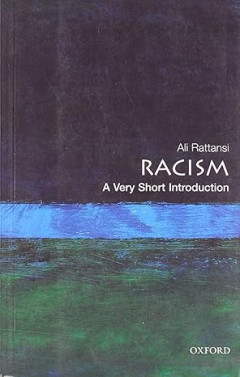
E-book Racism: A Very Short Introduction
From subtle discrimination in everyday life, to horrors like lynching in the Old South, cultural imperialism, and "ethnic cleansing", racism exists in many different forms, in almost every facet of society. Despite civil rights movements and other attempts at progress, racial prejudices and stereotypes remain deeply embedded in Western culture. Racism takes a frank and objective look at why the…
- Edisi
- -
- ISBN/ISSN
- 9780192805904
- Deskripsi Fisik
- 209 halaman
- Judul Seri
- -
- No. Panggil
- 170.01 RAT p
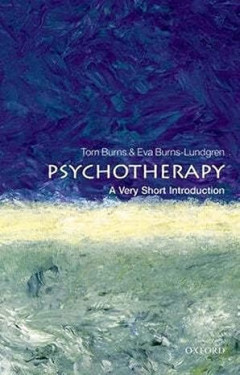
E-book Psychotherapy: A Very Short Introduction
Psychotherapy and counselling are now widely available to help people overcome emotional and psychological difficulties in their lives. They involve spending time with a professional in an emotionally safe and structured relationship to explore and express the issues that cause distress and difficulty, such as long term self-doubts, relationship problems, or the impact of a trauma or crisis. As…
- Edisi
- -
- ISBN/ISSN
- 9780199689361
- Deskripsi Fisik
- 346 halaman.
- Judul Seri
- -
- No. Panggil
- 131 BUR p
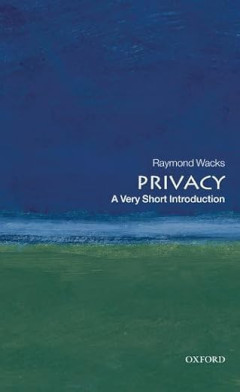
Ebook Privacy: A Very Short Introduction
It is widely recognized that our privacy is under threat. Electronic surveillance, biometrics, CCTV, ID cards, RFID codes, online security, encryption, the interception of email, the monitoring of employees--all raise fundamental questions about privacy. Legal expert Raymond Wacks here provides a compact introduction to this complex and controversial concept. He explores the tension between fre…
- Edisi
- -
- ISBN/ISSN
- 9780199556533
- Deskripsi Fisik
- 176 halaman
- Judul Seri
- -
- No. Panggil
- 170.01 WAC p
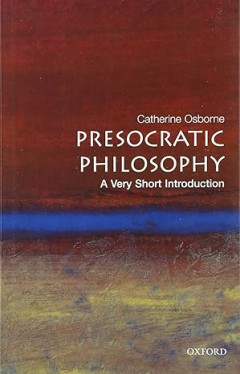
E-book Presocratic Philosophy: A Very Short Introduction
Generations of philosophers, both ancient and modern, have traced their inspiration back to the Presocratics. Part of the fascination stems from the fact that little of what they wrote survives. Here Osborne invites her readers to dip their toes into the fragmentary remains of thinkers from Thales to Pythagoras, Heraclitus to Protagoras, and to try to reconstruct the moves that they were making…
- Edisi
- -
- ISBN/ISSN
- 9780192840943
- Deskripsi Fisik
- 176 pages
- Judul Seri
- -
- No. Panggil
- 182 OSB p
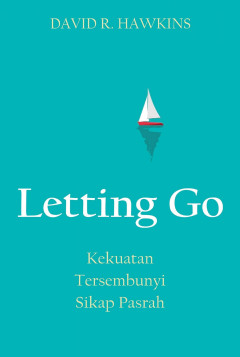
Letting Go (Kekuatan Tersembunyi Sikap Pasrah)
Letting Go adalah sebuah buku monumental yang menjelaskan cara paling efektif untuk menyirnakan berbagai hambatan batin menuju pencerahan. Setelah didera puluhan penyakit kronis yang tak tersembuhkan oleh metode medis, Dr. Hawkins memasrahkan semua penyakitnya hingga satu per satu sirna. Hampir semua penyakit fisik dan mental disebabkan oleh emosi-emosi negatif yang terpendam di alam bawah-sada…
- Edisi
- Cet. 6
- ISBN/ISSN
- 9786026799548
- Deskripsi Fisik
- 424 hlml; 1,5 x 20 cm
- Judul Seri
- -
- No. Panggil
- 155.25 HAW l
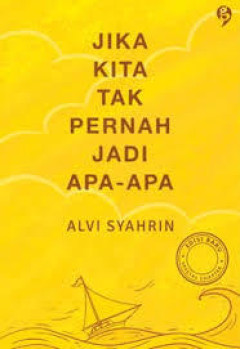
Jika Kita tak Pernah Jadi apa-apa
SECUPLIK CERITA UNTUKMU 1. Tapi, aku nggak tahu mau jadi apa 2. Pengin cepat-cepat lulus aja 3. Mengapa pendidikan di Indonesia begini banget? 4. Hanya murid rata-rata yang tak penting 5. Aku cuma pengin orang tuaku bangga 6. Salah jurusan: haruskah aku pindah? 7. Surat untuk anak rantau 8. Hari wisuda dan orang tua yang berharap 9. Pengusaha vs Karyawan vs PNS: mending mana? 10. Feno…
- Edisi
- Ed. 2 Cet. 2
- ISBN/ISSN
- 9789797809485
- Deskripsi Fisik
- xii, 244 hlm; 13 x 19 cm
- Judul Seri
- -
- No. Panggil
- 155.25 ALV j
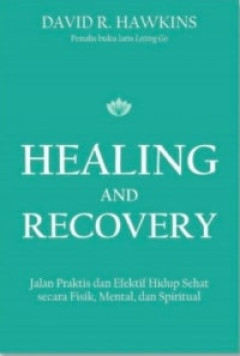
Healing and Recovery
Masyarakat kita hidup dengan stres, kecemasan, ketakutan, keresahan, rasa sakit, penderitaan, dan depresi. Alkoholisme dan kecanduan lainnya, obesitas, masalah seksual, masalah penuaan, kanker, hingga penyakit-penyakit baru yang dikaitkan dengan bakteri dan virus tertentu diberitakan oleh media sepanjang waktu. Umat manusia secara umum hanya memiliki sedikit informasi tentang bagaimana menghada…
- Edisi
- Cet. 3
- ISBN/ISSN
- 9786026799562
- Deskripsi Fisik
- 504 hlm; 13,5 x 20 cm
- Judul Seri
- -
- No. Panggil
- 155.25 HAW h

E-book The Time of Turath: Authenticity and Temporality in Contemporary Arab …
This study argues for a new view of contemporary Arab thought by analyzing the idea of time that underlies key discussions over Arab heritage (tur?th). Focusing on three authors, it shows how their work was shaped by a linear temporality and how they break with a common understanding of Arab thought by critiquing its temporal basis. This analysis leads to a richer engagement with contemporary A…
- Edisi
- -
- ISBN/ISSN
- 9783110984286
- Deskripsi Fisik
- -
- Judul Seri
- -
- No. Panggil
- 181.92 VIE t
Segala-galanya Ambyar
Kita hidup dalam zaman yang menarik. Secara material, segalanya tampak sangat baik melebihi zaman-zaman sebelumnya, Meski begitu, entah mengapa segala-galanya tampak kacau balau dan benar-benar ambyar. Apa yang terjadi? Jika ada satu orang yang bisa membantu kita mengenali bencana yang terjadi saat ini dan ikut membantu memberesi, salah satunya adalah Mark Manson. Dalam buku ini, Manson membent…
- Edisi
- -
- ISBN/ISSN
- 9786020522838
- Deskripsi Fisik
- 311 hlm; 14 x 21 cm
- Judul Seri
- -
- No. Panggil
- 152.4 MAN s
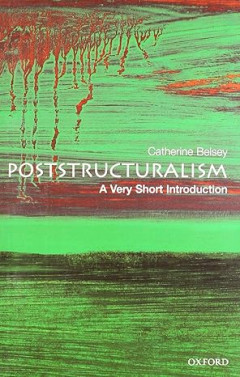
E-book Poststructuralism: A Very Short Introduction
Poststructuralism changes the way we understand the relations between human beings, their culture, and the world. Following a brief account of the historical relationship between structuralism and poststructuralism, this Very Short Introduction traces the key arguments that have led poststructuralists to challenge traditional theories of language and culture. While the author discusses such wel…
- Edisi
- -
- ISBN/ISSN
- 9780192801807
- Deskripsi Fisik
- 132 halaman.
- Judul Seri
- -
- No. Panggil
- 101 BEL p
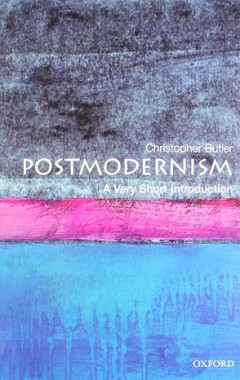
E-book Postmodernism: A Very Short Introduction
Postmodernism has become the buzzword of contemporary society over the last decade. But how can it be defined? In this highly readable introduction the mysteries of this most elusive of concepts are unraveled, casting a critical light upon the way we live now, from the politicizing of museum culture to the cult of the politically correct. The key postmodernist ideas are explored and challenged,…
- Edisi
- -
- ISBN/ISSN
- 9780192802392
- Deskripsi Fisik
- 152 halaman
- Judul Seri
- -
- No. Panggil
- 149.97
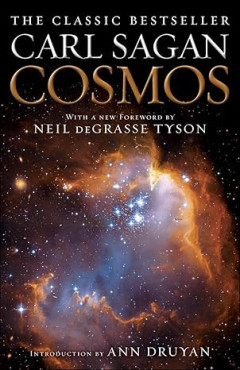
E-book Cosmos
In clear-eyed prose, Carl Sagan reveals a jewel-like blue world inhabited by a life form that is just beginning to discover its own identity and to venture into the vast ocean of space. Featuring full-color illustrations, Cosmos retraces the fourteen billion years of cosmic evolution that have transformed matter into consciousness, exploring such topics as the origin of life, the human brain, E…
- Edisi
- -
- ISBN/ISSN
- 9780307800985
- Deskripsi Fisik
- 358 halaman, ilus.
- Judul Seri
- -
- No. Panggil
- 113 SAG c
E-book Psychological Abuse : A Discussion Paper
This paper is a review of research on psychological abuse in interpersonal and family relationships including in settings such as long-term care residences. There is no simple definition of psychological abuse. Generally, researchers and front line service providers define it as the systemic destruction of a person’s self-esteem and/or sense of safety, often occurring in relationships where t…
- Edisi
- -
- ISBN/ISSN
- 9780662489948
- Deskripsi Fisik
- 37 hlm
- Judul Seri
- -
- No. Panggil
- 150 DOH p

E-book Ars Electronica 2023 Festival for Art, Technology, and Society: Exhibi…
Towards a New Social Contract Ars Electronica 2023 is dedicated to the complex questions of truth and the concept of ownership in this digital age. In doing so, the festival navigates the central questions of our time. The focus is on how our perception of “authentic” and “original” is being transformed and whether truth can be owned, and how this relates to digitalization and the rapid…
- Edisi
- -
- ISBN/ISSN
- 9783775756020
- Deskripsi Fisik
- 434 halaman, ilus.
- Judul Seri
- -
- No. Panggil
- 170.0 STO a
E-book The Muses of Truth and Transformation
The key event in this first part of the tale occurs when the old fisherman innocently opens the sealed flask he found, and the Djinn materializes from the bottle, and threatens to kill the old man. How are we to interpret this opening event?If this were someone’s dream, a common psychological interpretation would be that the Djinn, imprisoned in the bottle, represents a repressed, unconscious…
- Edisi
- -
- ISBN/ISSN
- 9781003471028
- Deskripsi Fisik
- 184 hlm
- Judul Seri
- -
- No. Panggil
- 150.1 CHI t
E-book Thirteen Fundamental Psychological Needs
Although individuals may have different goals and wishes on the surface, deep down we all want the same things. Our fundamental needs are universal: Regardless of culture, age, and lifestyle, everyone ultimately has the same set of needs. Needs are the basic requirements for our functioning and the nutriments for our well-being and advancement. We can only fully develop and flourish if all our …
- Edisi
- -
- ISBN/ISSN
- 9789463841856
- Deskripsi Fisik
- -
- Judul Seri
- -
- No. Panggil
- 150 DES t
E-book Reiner Schurmann and Poetics of Politics
To begin with a thinker who remained always attuned to the du-plicitous nature of beginning requires candor. There is a thetic dimension to every beginning, and we will do well not to deny it here. Rather, let us begin by attending to the things Reiner Schürmann himself said about beginning: “A starting point,” he wrote, “that neither abandons ordinary experience nor t…
- Edisi
- -
- ISBN/ISSN
- 9781947447738
- Deskripsi Fisik
- 178 hlm
- Judul Seri
- -
- No. Panggil
- 189 LON r
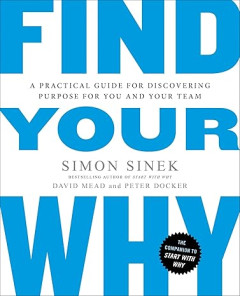
E-book Find Your Why: A Practical Guide for Discovering Purpose for You and Y…
Now Find Your Why picks up where Start With Why left off. It shows you how to apply Simon Sinek’s powerful insights so that you can find more inspiration at work -- and in turn inspire those around you. I believe fulfillment is a right and not a privilege. We are all entitled to wake up in the morning inspired to go to work, feel safe when we’re there and return home fulfilled at the en…
- Edisi
- -
- ISBN/ISSN
- 9780143111726
- Deskripsi Fisik
- 154 halaman, ilus.
- Judul Seri
- -
- No. Panggil
- 152.4 SIN f
E-book The Land Is Our Community : Aldo Leopold’s Environmental Ethic for t…
his is a book about Aldo Leopold’s land ethic,1 a view he developed over the course of his lifetime, a view that was informed by his experiences as a hunter, forester, wildlife manager, ecologist, con-servationist, and professor. It culminated in the essay “The Land Ethic” in A Sand County Almanac, published posthumously after his untimely death at age sixty-one in 1948. It has been extre…
- Edisi
- -
- ISBN/ISSN
- 9780226834474
- Deskripsi Fisik
- 198 hlm
- Judul Seri
- -
- No. Panggil
- 155.9 MIL t
E-book Aristotle and the Ontology of St. Bonaventure
The claim “what we know is what exists” appears, at first glance, to be quite an obvious statement – we know dogs and horses and so it seems obvious that dogs and horses exist. However, upon further reflection, it rather seems that what is most properly the object of our knowledge is not these particular dogs and horses themselves, but something that is universal – what Plato called a �…
- Edisi
- -
- ISBN/ISSN
- 9789461664884
- Deskripsi Fisik
- 227 hlm
- Judul Seri
- -
- No. Panggil
- 189 VAN a
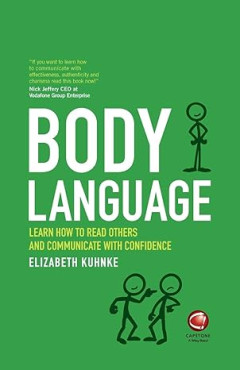
E-book Body Language: Learn How to Read Others and Communicate with Confidence
What does your body language say about you? From strangers on the street, to your closest friends and family – even if you're not speaking, you're saying a lot with your body. Body Language explores the way we use our bodies to communicate, the way we hold ourselves, the way we sit, stand, and point our hands, feet and eyes can all reveal how we are feeling in any given situation. This …
- Edisi
- -
- ISBN/ISSN
- 9780857087041
- Deskripsi Fisik
- 211 halaman
- Judul Seri
- -
- No. Panggil
- 153.6 KUH b

E-book Ethics 101: From Altruism and Utilitarianism to Bioethics and Politica…
Ethics 101 offers an exciting look into the history of moral principles that dictate human behavior. Unlike traditional textbooks that overwhelm, this easy-to-read guide presents the key concepts of ethics in fun, straightforward lessons and exercises featuring only the most important facts, theories, and ideas. Ethics 101 includes unique, accessible elements such as: -Explanations of the ma…
- Edisi
- -
- ISBN/ISSN
- 9781507204931
- Deskripsi Fisik
- 256 halaman, ilus.
- Judul Seri
- -
- No. Panggil
- 170.0 BOO e
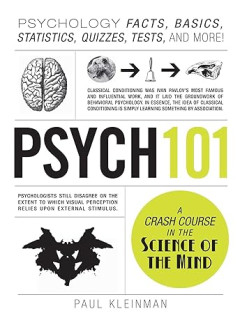
E-book Psych 101: Psychology Facts, Basics, Statistics, Tests, and More!
A hands-on approach to exploring the human mind Too often, textbooks turn the noteworthy theories, principles, and experiments of psychology into tedious discourse that even Freud would want to repress. Psych 101 cuts out the boring details and statistics, and instead, gives you a lesson in psychology that keeps you engaged - and your synapses firing. From personality quizzes and the Rors…
- Edisi
- -
- ISBN/ISSN
- 9781440543906
- Deskripsi Fisik
- 255 halaman, ilus.
- Judul Seri
- -
- No. Panggil
- 150.1 KLE p
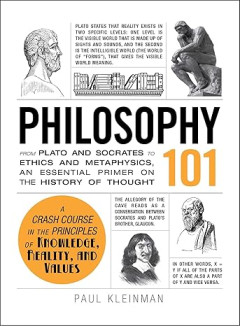
E-book Philosophy 101: From Plato and Socrates to Ethics and Metaphysics, an …
Too often, textbooks turn the noteworthy theories, principles, and figures of philosophy into tedious discourse that even Plato would reject. Philosophy 101 cuts out the boring details and exhausting philosophical methodology, and instead, gives you a lesson in philosophy that keeps you engaged as you explore the fascinating history of human thought and inquisition. From Aristotle and Heideg…
- Edisi
- -
- ISBN/ISSN
- 9781440567674
- Deskripsi Fisik
- 364 halaman, ilus.
- Judul Seri
- -
- No. Panggil
- 101 KLE p
 Karya Umum
Karya Umum  Filsafat
Filsafat  Agama
Agama  Ilmu-ilmu Sosial
Ilmu-ilmu Sosial  Bahasa
Bahasa  Ilmu-ilmu Murni
Ilmu-ilmu Murni  Ilmu-ilmu Terapan
Ilmu-ilmu Terapan  Kesenian, Hiburan, dan Olahraga
Kesenian, Hiburan, dan Olahraga  Kesusastraan
Kesusastraan  Geografi dan Sejarah
Geografi dan Sejarah